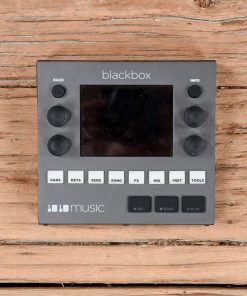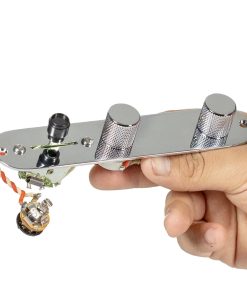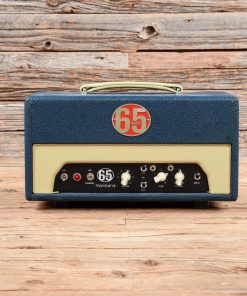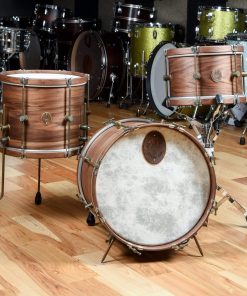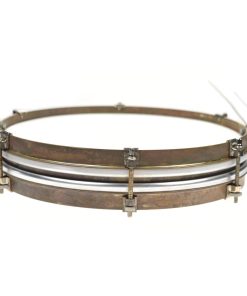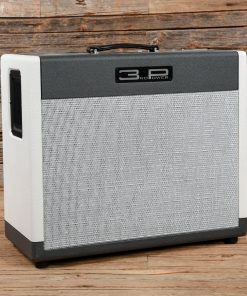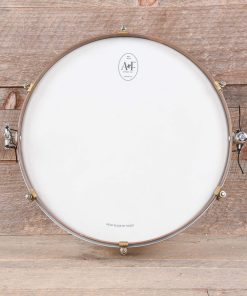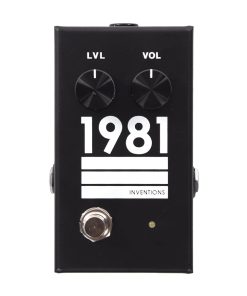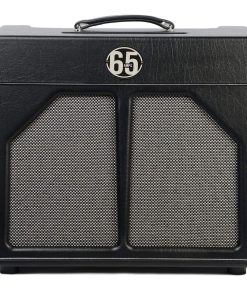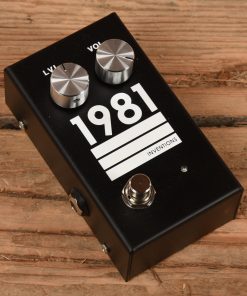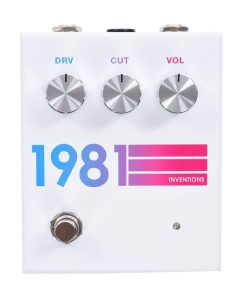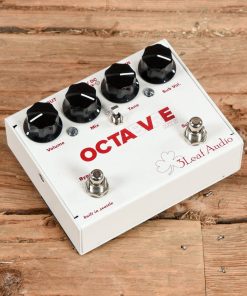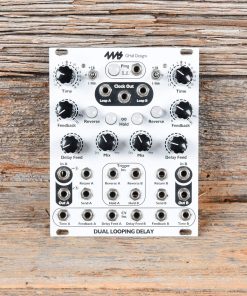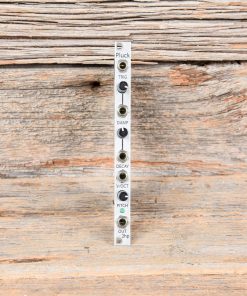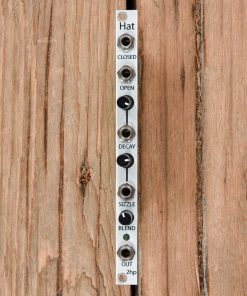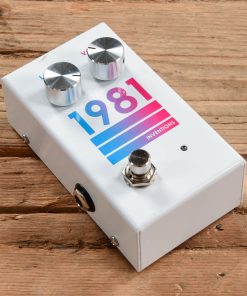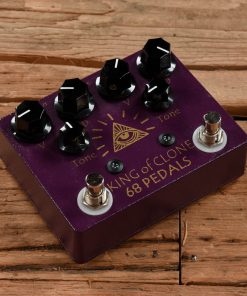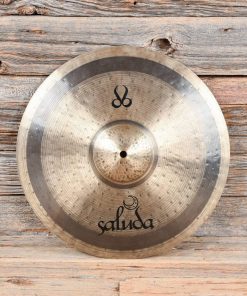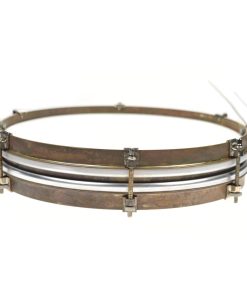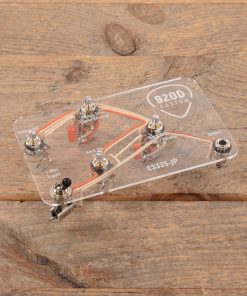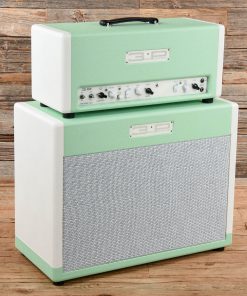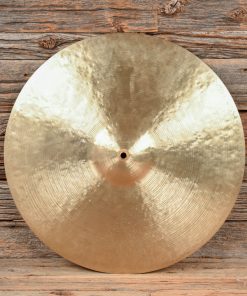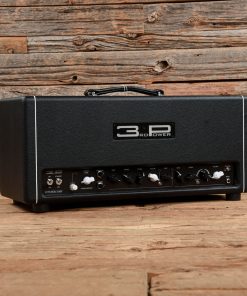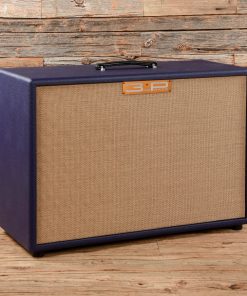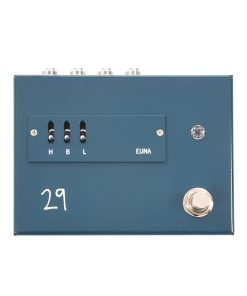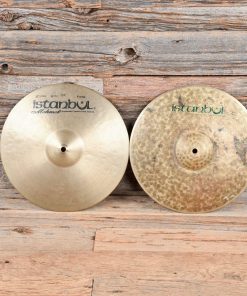Empirical Labs EL8X Distressor Compressor w/ British Mod Empirical Labs
$ 1.799,00 $ 449,75
All eight of the Distressor’s curves are unique and distinctive, from the 1:1 mode that simply warms up signal with low order harmonics without intentional compression, to the “Nuke” setting – a brick wall limiting curve that shines on live drum room mics. Each curve has its own personality and several actually use different circuitry, and are effectively different compressors. Most exceptional is the 10:1 “Opto” ratio which uses separate detector circuitry to emulate the oldest (and valued) “light controlled” devices, such as the LA-2A.
Another large part of the Distressor’s personality and power derive from three modes that color the signal, even without compression. These extended audio modes were designed to allow emulation of some very old and expensive vintage compressors & limiters, and let the Distressor deliver a classic “knee” sound all its own by providing user programmable, warm harmonic distortion. In addition to the basic distortion mode, Distort 2 emphasizes tube-like 2nd order harmonics, while in Distort 3 setting the distortion becomes dominated by 3rd harmonics more closely resembling tape. Two HP filters – one in the audio path, one in the detector path – are also available to help with low frequencies that can cause pumping and breathing.
The concept of British Mode came from an unusual setting on the classic UREI LN1176 limiter. The unit was designed to have only four ratios, each ratio being engaged by selecting one of four buttons. However, as early as 1980 (or before), renegade recording engineers, always on the lookout for something a little more “over-the-top”, found that you could make all four buttons stay in if you pressed them just right. What resulted was a very aggressive sound that had some elements of the unit’s 20:1 ratio, but with an unusual knee and new envelope shape. Somewhere along the line, someone called it “British Mode”, and the name stuck.
The original Distressor stereo link function used a summing and phase detection method, which allowed slight stereo image shifting. Although frequently desirable for its phase correction, and its “thickening” on open room mics and other stereo sources, this approach can sometimes be a problem on stereo program material where the producer/engineers want to maintain absolute left/right balance at all times. With the new “Stereo Image Link” option, the EL8-X now has three link options – the original “phase” link, the new Image Link and the combination of the two, phase and image linking – something never before offered on any compressors or limiters.
- Frequency Response – 2 Hz to 160 kHz in clean audio mode (+0, -3 dB). Response is shaped in distortion modes (Dist 2, Dist 3).
- Dynamic Range – 110 dB from max. output to min. output in 1:1 mode. Greater than 100 dB signal to noise in distort 3 mode.
- Distortion – ranges between .02% and 20% depending on distortion mode and release times set on front panel.
- I/O – DC Coupled input and outputs.
- Time Constants – Attack range 50uS – 50mS. Release range .05 sec to 3.5 seconds, normal modes and up to 20 seconds in 10:1 opto mode. Time constants are dependent on ratio.
- Power Consumption – 15 Watts Max.
- Metal Chassis – single height 1.75″ high, 10″ deep, 19″ wide.
- Shipping info – 12.1 lbs mono. Mono box dimensions 22.5″ x 18.5″ x 3 1/4″.
Fast Shipping with Professional Packaging
We offer a wide range of shipping options due to our long-standing partnerships with UPS, FedEx and DHL. Our warehouse staff are trained to pack your goods exactly according to the specifications we offer. Before shipping the goods are thoroughly examined and secured. Every day, we send thousands of packages to clients from all over the world. Our determination to be the biggest online retailer in the world is shown by this. The warehouses are located in Europe as much as they are in USA.
Note: Orders with more than one product will be assigned a distinct processing time, dependent on the particular item.
Before shipping, we will examine the items ordered thoroughly before sending the items. The majority of orders are shipped within 48 hrs. The delivery estimate is between 3-7 days.
Returns
The stock is constantly changing and cannot be fully controlled by us because of the involvement of several parties including the factory and our warehouse. Stock levels can fluctuate at any given time. Please be aware that it is possible that your order could become unavailable even after you've placed your order.
Our policy is valid for a period of 30 days. If 30 days have passed by since your purchase however, we're unable to give an exchange or refund.
In order to be eligible for a refund your product must be unopened and in the same state as you received it. It should also be in the original package.
Related products
Effects and Pedals / Controllers, Volume and Expression
Drums and Percussion / Acoustic Drums / Full Acoustic Kits
Amps / Guitar Heads
Drums and Percussion / Acoustic Drums / Full Acoustic Kits
A&F Drum Co. 12/14/18 3pc. Walnut Club Drum Kit A&F Drum Co.
Drums and Percussion / Acoustic Drums / Snare
A&F Drum Co. 1.75×12 Pancake Raw Brass Snare Drum A&F Drum Co.
Amps / Guitar Combos
3rd Power Amplification British Dream Combo 3rd Power Amplification
Accessories / Books and DVDs
Drums and Percussion / Acoustic Drums / Snare
A&F Drum Co. 1.75×14 Pancake Raw Brass Snare Drum A&F Drum Co.
Accessories / Books and DVDs
Effects and Pedals / Overdrive and Boost
Amps / Guitar Combos
Effects and Pedals / Overdrive and Boost
Effects and Pedals / Overdrive and Boost
1981 Inventions DRV Overdrive White Hyperfade 1981 Inventions
Effects and Pedals / Octave and Pitch
Accessories / Merchandise
Accessories / Books and DVDs
Keyboards and Synths / Synths / Eurorack
Keyboards and Synths / Synths / Eurorack
Keyboards and Synths / Synths / Eurorack
Parts / Amp Parts
920D Custom JB-CON-CH-BK Upgraded Replacement ’62 Jazz Bass Concentric Control Plate 920D Custom
Effects and Pedals / Overdrive and Boost
Effects and Pedals / Overdrive and Boost
Drums and Percussion / Cymbals / Crash
Drums and Percussion / Acoustic Drums / Snare
A&F Drum Co. 1.75×14 Pancake Raw Brass Snare Drum A&F Drum Co.
Parts / Amp Parts
920D Custom ES335-JP Wiring Harness for Gibson/Epiphone ES-335 w/Four Push/Pulls 920D Custom
Amps / Guitar Cabinets
3rd Power Amplification Dual Citizen 2-Channel 40-Watt Head w/ 2×12 Cab 3rd Power Amplification
Drums and Percussion
20″ Craig Lauritsen Custom Rustico Crash Ride Cymbal USED Chicago Music Exchange
Amps / Guitar Cabinets
3rd Power Amplification Kitchen Sink Guitar Head 3rd Power Amplification
Amps / Guitar Cabinets
3rd Power Amplification 2×12″ Guitar Speaker Cab 3rd Power Amplification
Effects and Pedals / Overdrive and Boost
Drums and Percussion / Cymbals / Hi-Hats








